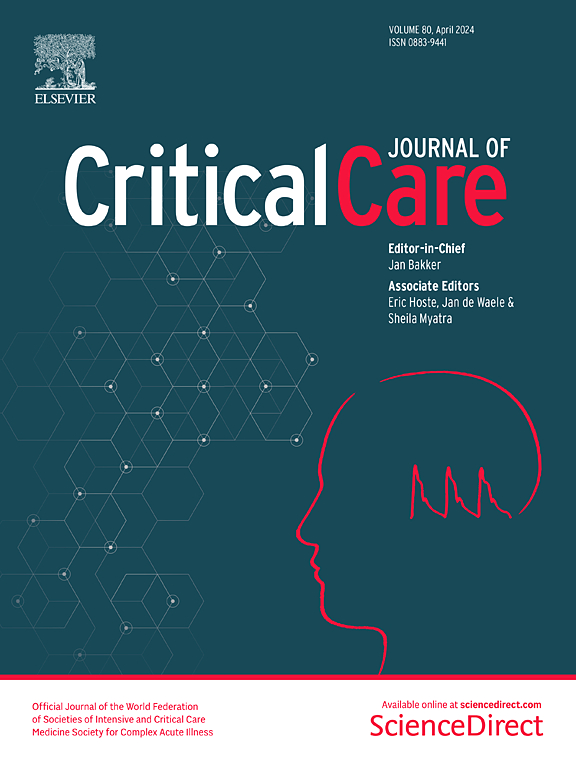Impact of syndromic molecular diagnostics on antimicrobial adequacy and time to therapy in critically ill patients with pneumonia: a systematic review and meta-analysis of randomized trials
IF 9.3
1区 医学
Q1 CRITICAL CARE MEDICINE
引用次数: 0
Abstract
Pneumonia is a leading cause of ICU admission and mortality, requiring prompt and adequate antimicrobial therapy to improve outcomes. Conventional cultures are slow and often insensitive, delaying targeted treatment. Syndromic PCR panels offer rapid identification of pathogens and resistance genes directly from respiratory samples, potentially improving early antibiotic optimization. However, the true clinical benefit of these diagnostics in critically ill patients remains uncertain. We conducted a systematic review and meta-analysis of randomized controlled trials (RCTs) comparing PCR-based molecular diagnostics with standard culture techniques in predominantly adult ICU patients with severe community-acquired, hospital-acquired, or ventilator-associated pneumonia. Literature searches were performed in PubMed, Embase, and Cochrane CENTRAL from inception to July 16, 2025. The primary outcome was in-hospital mortality. Secondary outcomes included adequacy of initial antimicrobial therapy and time to effective antibiotic administration. Data were synthesized using random-effects models. We included five randomized controlled trials comprising 2,466 patients. Syndromic PCR testing did not significantly reduce in-hospital mortality, the primary outcome (RR 1.04; 95% CI: 0.90–1.21; p = 0.57; I² = 0%). However, PCR testing was associated with a higher rate of adequate initial antimicrobial therapy (RR 1.82; 95% CI: 1.10–3.00; p = 0.02; I² = 97%) and a reduction in time to effective antibiotic administration (mean difference − 27.98 h; 95% CI: − 46.07 to − 9.89; p = 0.002; I² = 94%). Syndromic PCR diagnostics did not reduce in-hospital mortality in critically ill patients with pneumonia but were associated with improved adequacy of initial antimicrobial therapy and faster initiation of effective treatment. These findings support their role as a complementary tool in ICU-based antimicrobial stewardship. PROSPERO CRD420251006301.综合征分子诊断对重症肺炎患者抗菌药物充分性和治疗时间的影响:随机试验的系统回顾和荟萃分析
肺炎是ICU住院和死亡的主要原因,需要及时和充分的抗菌治疗来改善预后。传统文化是缓慢的,往往是不敏感的,延误了有针对性的治疗。综合征PCR检测板可直接从呼吸道样本中快速鉴定病原体和耐药基因,有可能改善早期抗生素优化。然而,这些诊断对危重病人的真正临床益处仍不确定。我们对随机对照试验(rct)进行了系统回顾和荟萃分析,比较了pcr分子诊断与标准培养技术在重症社区获得性、医院获得性或呼吸机相关肺炎的主要成人ICU患者中的应用。文献检索在PubMed、Embase和Cochrane CENTRAL中进行,检索时间从开始到2025年7月16日。主要终点是住院死亡率。次要结果包括初始抗菌治疗的充分性和有效抗生素使用的时间。数据采用随机效应模型合成。我们纳入了5项随机对照试验,包括2466名患者。综合征PCR检测没有显著降低住院死亡率(主要结局)(RR 1.04; 95% CI: 0.90-1.21; p = 0.57; I²= 0%)。然而,PCR检测与较高的初始适当抗菌药物治疗率(RR 1.82; 95% CI: 1.10-3.00; p = 0.02; I²= 97%)和有效抗生素给药时间缩短(平均差为- 27.98 h; 95% CI: - 46.07至- 9.89;p = 0.002; I²= 94%)相关。综合征PCR诊断并没有降低肺炎危重患者的住院死亡率,但与改善初始抗菌治疗的充分性和更快地开始有效治疗有关。这些发现支持它们在重症监护病房抗菌药物管理中作为补充工具的作用。普洛斯彼罗CRD420251006301。
本文章由计算机程序翻译,如有差异,请以英文原文为准。
求助全文
约1分钟内获得全文
求助全文
来源期刊

Critical Care
医学-危重病医学
CiteScore
20.60
自引率
3.30%
发文量
348
审稿时长
1.5 months
期刊介绍:
Critical Care is an esteemed international medical journal that undergoes a rigorous peer-review process to maintain its high quality standards. Its primary objective is to enhance the healthcare services offered to critically ill patients. To achieve this, the journal focuses on gathering, exchanging, disseminating, and endorsing evidence-based information that is highly relevant to intensivists. By doing so, Critical Care seeks to provide a thorough and inclusive examination of the intensive care field.
 求助内容:
求助内容: 应助结果提醒方式:
应助结果提醒方式:


